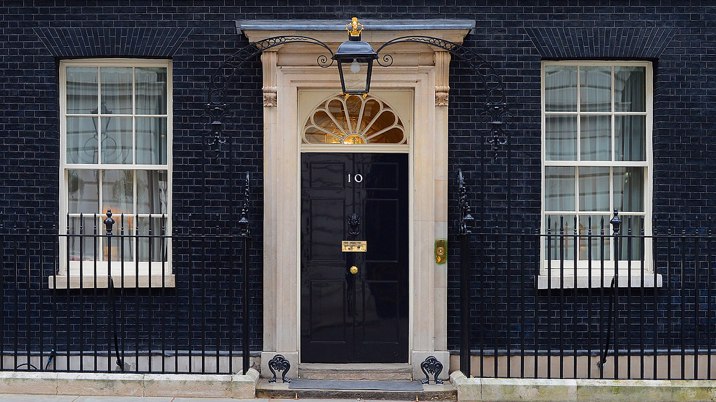
Boris Johnson: the endgame
A long time coming
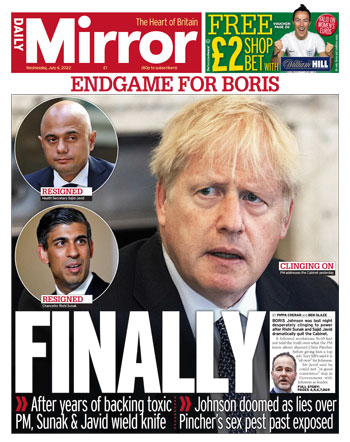
“The party’s over” declared the Mirror in January when the Downing Street lockdown gatherings were exposed. And again last month after Boris Johnson survived a vote of confidence among his MPs.
“It’s over” wrote The New European’s Tim Walker last Sunday when the Mail on Sunday splash reported that the prime minister had been warned two years ago about Chris Pincher’s behaviour.
The wallpaper, the Caribbean holiday, the care homes, the parties, the sex scandals, the fraud scandals, the cronyism, the treehouse, the private jet, the constant dissembling: there have been so many “crimes” and so many occasions over the past three years when Johnson’s media critics rubbed their hands and said “He can’t survive this…” And been wrong.
The Mirror and Guardian must have thought it was slam dunk when the Partygate scandal broke and grew – there is still an ongoing investigation into whether the prime minister deliberately misled parliament – but he weathered that storm.
Walker concluded in his Mandrake column for The New European that the MoS lead showed that the most powerful media brand in the country had turned against its man and that his number must therefore be up. Rothermere had, he reported, berated his editors for being out of touch with the country’s opinion on Johnson, and this had signalled a dramatic U-turn. The next day, the daily ran a leader declaring Johnson “still the best man to lead Britain”.
But now he’s going. Forced out because a lie about someone else’s sexual transgression was too much for his Buckeroo party, already overburdened with mistruths, obfuscations, falsehoods, whoppers and fibs, to bear.
Equivocal headlines
In other times, the resignations of two senior cabinet ministers would have meant the writing on the wall could no longer be painted over. But this was Johnson, so yesterday’s headlines were equivocal. Rightly so, as it turned out – he went neither quietly nor quickly, leaving dead tree journalists struggling to keep up and remain relevant. It wasn’t only Johnson who could be described by Susie Dent’s word of the day, “filipendulous” or “hanging by a thread”, as the Telegraph splash had it. The Times, Guardian, FT and Independent all said he was “on the brink”, while the Mirror and i were bolder with the “endgame”.

The loyalists weren’t giving up though; the Sun had Johnson in the “last chance saloon”, a feeble and clichéd headline for which it was chastised on Twitter by former editor Kelvin MacKenzie, who challenged his followers to do better (his own offering was “From BoJo to heave-ho”; his selection as winner, “Last chance buffoon”), while the Express continued its on-another-planet approach (and its weird philosophy on punctuation) with “Boris fights on! Declaring…I’m now free to cut taxes”. The Mail was less confident, asking, “Can even Boris the Greased Piglet wriggle out of this?”
The Greased Piglet. That’s the prime minister we’re talking about here. Yes, I know that is what others call him (I think David Cameron coined the phrase), but they are generally his enemies, not the paper that thinks he’s the right man to lead the country. What about the dignity of office? I know, there are plenty who will say that the words ‘dignity’ and ‘Boris Johnson’ don’t live in the same sentence and that I’m being naïve to suggest that they should. But shouldn’t we expect some decorum from the morally upright Mail?
Get exit done
By last night, with more than 40 ministerial resignations in 36 hours – and the sacking of Michael Gove – you’d have thought that this truly was the end, but Johnson was digging in and there was an even greater reluctance to call it on the front pages this morning.
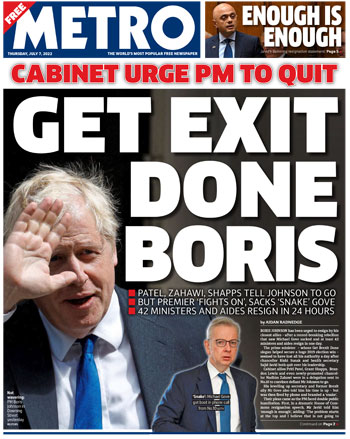
The Mirror and Metro were losing patience and both went for the neat “Get exit done” line, the Times had Johnson fighting for his life, the Telegraph had him mortally wounded. But the loyalists still weren’t giving up hope. The Mail said he was “staring down” the mutiny, the Express accepted the “me or political oblivion” argument and the Sun had the defiant “You’ll have to dip your hands in blood to get rid of me”.
Of course they were all on a hiding to nothing. Whatever they printed was bound to be overtaken by events today. I was surprised that they all went for the straightforward “news” story. Had I been editing, I’d have gone sideways with what we used to call a “tick-tock” narrative, or a piece of colour writing. This sort splash is not unusual when it comes to war or disaster reporting, but I’m not sure I’ve seen it for a political story; I think it could have worked and been less of a hostage to fortune than the traditional approach.
Remainers’ revenge? Really?
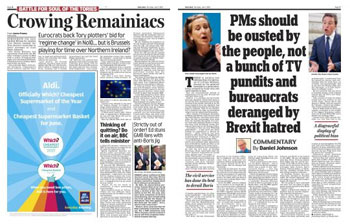
But what was striking was the bullish attitude of the whitetops. The Express not only had spreads headlined “PM has mandate for 14m people to get the job done” and “Boris clings to power with remarkable tenacity”, but also a leader applauding his willingness to fight to the bitter end and a Leo McKinstry oped suggesting that if the prime minister could recapture his buccaneering spirit, he might yet survive. The Mail meanwhile had a full-page leader proclaiming that Johnson “still stood head and shoulders above any of his would-be assassins”. It also devoted two pages to blaming “Remainiacs” – notably the former senior civil servant Lord McDonald, whose intervention over Chris Pincher on Tuesday morning precipitated the crumbling cabinet house of cards – and “bureaucrats deranged by hatred of Brexit” for the fall of its hero.
Both took up Johnson’s line that he had a mandate from 14 million people – which others, including the Telegraph and Times, debunked. As the latter pointed out, we have a parliamentary, not presidential system. Those people voted for a Conservative government, not a particular leader. It’s also worth pointing out that 14 million out of an electorate of more than 47 million is hardly a majority. In fact, more voted against the Tories than for them; indeed, more voted for Remain in the referendum than voted for the Conservatives in 2019.
The loyalist papers
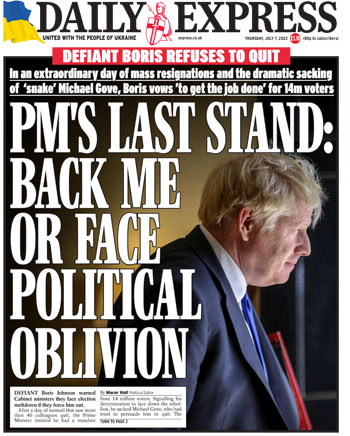
The Express has been, and probably always will be, slavishly loyal to every Conservative leader – it will be upbeat and enthusiastic no matter who comes next – so its devotion to “Boris” has never been surprising.
There has always, however, been something deeply uncomfortable and incongruous about the Mail’s attitude to his premiership. Everything about his character is alien to all the paper stands for. Imagine a Labour leader moving his lover (the Mail would call her his “mistress”) into No 10 – and announcing her pregnancy on the same weekend he had been absent from work negotiating his divorce settlement with his wife of 27 years.
Then look at his behaviour in office: the extravagances, the self-indulgences, the law-breaking, the misjudgements, the lying. The Mail titles led the way in reporting and questioning the flat refurbishment and the Mustique holiday, but they didn’t censure him over them. It brushed aside the parties as regrettable, but trivial; critics had lost their sense of perspective, there were more important things to worry about. But – even while trotting out the “got the big calls right” mantra – it didn’t like his government’s policies on the key issues of the pandemic lockdown and taxation either.
Most wearying of all has been the papers’ blithe insistence that Johnson was the only person for the job. Even if you accept that he was a “winner” who saw off the threat of Corbynism and delivered Brexit (that’s a very big “if” for a lot of people), what sort of indictment is it of the 350-odd Conservative MPs that the Mail believes that not one of them is up to leading the team? These are the very people the paper urged its readers to vote into power.
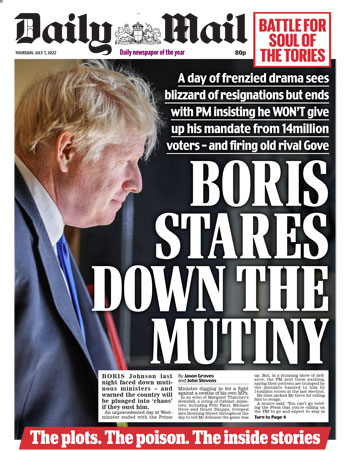
For the Mail (and others), it is imperative that we have a Conservative government, yet it apparently sees no paradox in simultaneously saying that without this particular man at its head, the party is sunk; no conflict in expecting the utmost probity from those of whom it disapproves, while treating honesty and integrity as optional extras in our most senior politician. In other words “We want you to vote in this bunch of incompetents whose only asset is their formerly popular, but deeply flawed, captain.”
Which is exactly what The Times did in 2019, in urging first Tory members and then the country to back Johnson. By yesterday it was calling for him to resign.
But the Mail continued to suffer from the same malaise as the prime minister himself, blind to all the recent evidence – most notably from the two by-election defeats last month – that it was the very fact that he was at its head that was sinking the party; he was its scourge, not its saviour, at a time when Keir Starmer was making little headway in building Labour support.
Much of this was also true of the Sun, but Murdoch’s tabloid desists from adopting the middle-class Victorian values moral tone that dominates Dacre’s Mail in every other area. And even it pretty well accepted in this morning’s leader that he should go. Does either think the country is in a good place just now, with infrastructure creaking and inflation soaring? We’ve had a pandemic, there’s a war in Europe. But that applies to other countries whose economies are in better shape. It’s all very well saying that we should stop being distracted by karaoke parties and let the prime minister get on with the job. But we have had 12 years of Conservative government, three of them under Johnson. Maybe it would have been worse under Miliband or Corbyn, but to pretend that Johnson was some new broom coming in to clean up others’ mess is disingenuous to say the least.
Meanwhile, those lefties on social media have their own theories as to why these titles are so ultra-loyal: Rothermere is a non-dom and Starmer is threatening to review non-dom status; Labour has also promised to push ahead with Leveson 2, which was supposed to examine the relationships between the press, politicians and the police. In other words, “Don’t think it’s the economy, stupid!”
And will we be seeing Lord Dacre in the resignation honours list? Surely it would be the ultimate irony for the man who raged against Cameron and Blair’s cronyism and the “House of unelected wreckers” to allow himself to be cloaked in ermine.
Union bashing
Getting from A to B has turned into a real pain. Petrol and diesel prices have gone through the roof, fuel protesters are blocking the roads, staff shortages are leading to long airport queues and delayed flights, and rail strikers are disrupting train services.
It is only natural media coverage of all this should major on the effects on readers, viewers and listeners. But it is also the journalist’s job to examine the causes and explain the background. If there’s room for half a dozen people saying, “I had to set out for work at 5am”, there should be room for at least a panel setting out the issue at the heart of the matter.
But that part of the job seems to have eluded many of our newspapers, which prefer to hark back to industrial conflicts from half a century ago and paint a picture of reckless union “barons” holding the country to ransom with their outrageous demands.

I looked at the Express as a random example. Over the course of the past month, it has carried more than a hundred news stories, comment columns, leaders and letters about the rail strikes. It has focused on RMT leader Mick Lynch and suggested in a splash that the whole dispute is centred on his “hatred” of the prime minister. It has reported that the strikers had “already had pay rises and bonuses”. It repeatedly refers to rail workers having a median income of £44,000 and to train drivers earning £59,000 a year. The whole thrust of the coverage has been that the union is being greedy and that workers should be shorn of the right to withdraw their labour if it inconveniences anyone (as opposed to putting them in danger). A McKinstry oped headlined “Scrap unions’ legal protection to tame troublemakers” pretty well summed up the approach.
There is absolutely nothing wrong with any newspaper taking a view on any industrial dispute – especially one that has such an impact on people’s everyday lives. It is the failure adequately to put both sides of the argument – to inform the reader properly – that is unacceptable. It goes without saying that the union is “making demands” rather than “seeking” a pay rise. But how much does it want? You might think that the sentence: “The union wants 7%, the bosses have offered 2% plus another 1% in return for job cuts” would not be too hard to shoehorn in. But those simple facts have been absent from almost every story. Teachers and doctors, among others, are asking for far more – and are also threatening industrial action. But they aren’t today’s bogeymen. They’ll get their turn in the coming weeks. (Junior criminal barristers are also striking, but the Express will notice that only when someone it doesn’t like isn’t put on trial and jailed; other papers are far more sympathetic to these professionals than they are to the blue-collar rail workers.)
Not knowing their Aslef from their RMT

Going back to that spread “Strikers already had pay rises and bonuses”, this refers to half the people taking action having had a rise of 3.2% in 2019 and 2.1% in 2020. Pay was frozen last year and, as we know, the inflation rate is now approaching 11%. It was over 9% when the RMT asked for 7% - so less than the increase in the cost of living and after a year’s freeze. In the context of the increased cost of living, it seems quite a modest claim. But there is always the question of affordability and the risk of “if they get it, everyone else will want it…” And they do seem to be better paid than other public workers – that £44,000 compares with the national average wage of £26,000, £31,000 for nurses and £37,000 for teachers.
Many of these numbers come courtesy of Transport Secretary Grant Shapps, who has also made great play of the fact that the government had pumped £16bn into the railways during the pandemic. As though that went directly into the workers’ pockets. Just as when a school gets some more money, it goes straight to the teachers and not to buy books or pens or computers or to pay the heating bill.
Then there is all that emphasis on how well train drivers are rewarded – up to £70,000 before overtime for some of them. Which all plays into the greed narrative. Except train drivers belong to a different union, Aslef, which is not involved in this dispute. And including those high earners in calculating rail workers’ average pay obviously skews the figures relating to those who are actually on strike. (As it happens, Aslef, also led by a man called Mick, is now balloting members on strike action, so it will be interesting to see if the Express and others suddenly learn to differentiate between the various arms of the industry.)
Oh yes, and speaking of ballots, it’s worth noting that 89% of the RMT workers who voted (a 71% turnout) backed the strike. That’s quite the mandate, bearing in mind that they were voting to deprive themselves of pay for an unknown length of time.
If you’re publishing a newspaper, you can take any editorial line on any issue you wish. You can think that any or all of the above points are subsidiary to what you may think is unacceptable disruption in pursuit of unreasonable demands. But it is still beholden on you to get your facts straight and not to spin or distort them. And surely everyone should have learnt by now never to quote government figures as though they are gospel?
Unreasonable demands? It all depends on who's making them

While we’re looking at the Express, let’s consider its view on another “pay” claim – and one that comes more directly from the public purse.
Last year, it was appalled by the then chancellor’s decision to suspend the “triple lock” guarantee on state pensions. Had it been applied, pensioners would have had a rise of about 8% when inflation was running at about 3%. This was at a time when younger people were being asked to make great sacrifices to protect the older, more vulnerable, generation; when people working for their living and keeping the country going were seeing their pay frozen or being laid off or furloughed.
But even before the increase went into bank accounts in April, the war in Ukraine had sent fuel prices soaring, inflation had got a grip and that over-generous 8% didn’t look so far out of kilter. The Express thought there should be a rethink, splashing in March on “It’s time to raise state pensions, Mr Sunak”. In May, it was again demanding action, declaring “It’s impossible! Pensioners can’t cope with 9% inflation”. And last month, it was celebrating “It’s only fair! Rishi defends £1,000 boost to pensions” as Sunak defended a likely 10% increase next year.
There was no spread inside saying “Pensioners have already had pay rises” or references to the increases of 3.8% in 2019, 3.9% in 2020, 2.5% in 2021 and 3.1% in 2022.
OK, this is perverse. These percentages add up to very small actual sums of money – less than a fiver a week. Most pensioners cannot go out and find a better-paid job or do extra hours.
As ever, it’s the double standards that get to me. The Express thinks it right and proper for it to press the case for its older readers, yet it is somehow wicked for unions to press the case for their members. Which is actually what they are there for.
And that’s without venturing onto the perilous ground of the sort of salary increases and bonuses the paper’s owners, Reach, pays its executives in comparison to its journalists. Just for the record, chief executive Jim Mullen’s 2021 pay and bonuses came to nearly £4m last year, while chief financial officer Simon Fuller picked up nearly £3.5m. Daily Mirror journalists, also employed by Reach, have just accepted a 3% offer. Regional colleagues are voting on whether to strike.
Ob‐La‐Di, Ob‐La‐Da

Here’s a thing of beauty from the Washington Post this week. Obviously inspired by Paul McCartney’s Glastonbury appearance, the subs made merry with the Beatles songbook for their letters page headings. Purists might argue that it would have been even better had all the lyrics come from McCartney. But how much better just to enjoy.
The missing one

And here’s a little blip from the Sunday Telegraph. Which one of Spector’s 11 busted myths wasn’t worth a front-page puff?
Front page of the fortnight
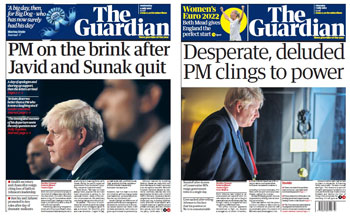
When you get a big story, it should be easy. Yet somehow the past two days’ offerings have generally missed the mark – too cluttered, too gimmicky, too bland. Maybe because we’d been here so often before? But I thought the Guardian got it just right. I’m not sure when yesterday’s picture was taken – though it clearly wasn’t at that morning’s Cabinet – but it was the perfect file shot for the occasion; today’s was a live photograph that featured on five front pages, but none as effectively in the Guardian. The headlines were straight and to the point, the puffs clean, the teasers well presented. Nice work.
PS: What happened to the bar code yesterday? If they could move it from the front then, why not for the arguably bigger story today?
Liz Gerard’s Notebook is a fortnightly column published in the InPubWeekly newsletter. To be added to the mailing list, enter your email address here.












